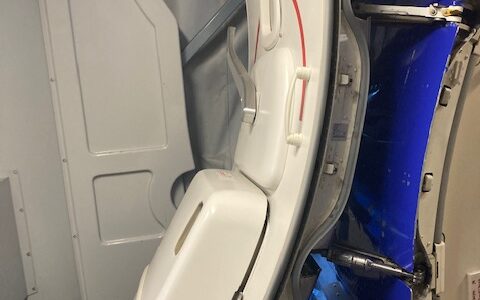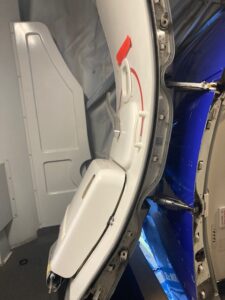
Flight Attendant Return-to-Work

<– This door stands between flight attendants returning to work, and having to find another job.
After a torn rotator cuff, neck injury, bicep-tendon rupture, or lower back disc herniation, a flight attendant MUST pass the physical exam in order to return to work.
.
The FAA is very strict rules about who can return to flight duty status. The FAA is the Federal Aviation Administration, they enforce regulations across the United States and overseas. There are two main hurdles seem to prevent many flight attendants from returning to their pre-injury jobs. Number one : lifting bags for passengers, first aid equipment, supplies, especially into the overhead bills. Number two : closing the emergency cabin door, which usually requires 80 pounds of pressure.
.
Herndon Flight-Attendant Lawyer, Doug Landau, has helped many cabin crew clients with their on the job injury cases. As much as they want to return to employment with the airlines, to preserve their flight privileges and other benefits, they must pass a physical test. If they can’t pass the physical requirements, their job may not be safe for them to be in the air. Less physically strenuous jobs could include ramp agents, help desk positions or reservationists.
.
While Lawyer Landau has been able to transition workers to other jobs within the airlines, it is not always possible. In most cases, when the airline settle a permanent injury Worker’s Compensation claim, they also seek separation from the injured employe. It is a bitter pill to swallow, but sometimes the cabin crew member has to face the facts. In the end, they may be better off not returning to the same occupation. After a cervical or lumbar spine injury or shoulder surgery, lifting grandma’s very heavy carry-on bag can be an impossible or dangerous task. Because passengers do not want to pay for checked bags, it’s a recipe for re-injury and time loss from work. Some small aircraft jets do not require as much pressure and strength to close the cabin doors, but there are still certain minimum requirements mandated by the federal authorities, as well as the airlines themselves.
.
If you or someone you care for has undergone an injury at the airport, or has a similar case, do not hesitate to contact us at frontdesk@landaulawshop.com or call (703) 796-9555.
